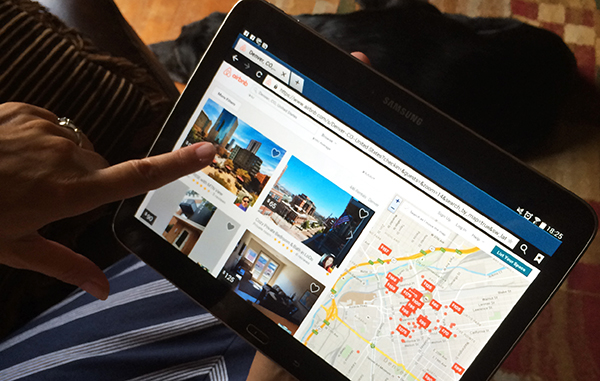The cat and mouse games have begun.
The majority of Airbnb landlords in Denver haven’t completed newly required paperwork to register their business and cut the city a piece of the action.
As of Monday, only 706 of more than 4,000 Denver residences listed on Airbnb have licenses, according to data provided to BusinessDen by the city and Airbnb. That comes out to 18 percent, and jibes with a cursory look at Airbnb postings, which now are required to publish their Denver license number on listings.
“We’ll see that number continue to rise here over the next several weeks,” said Denver spokesman Dan Rowland, adding that compliance was slow to start in other cities with similar legislation.
Last year Denver City Council passed a law – meant to appease both neighborhood groups and affordable housing advocates – that requires a business license and levies city taxes, including a 10.75 percent lodging tax. Some Colorado municipalities, like Steamboat Springs, defer to Airbnb to collect and remit sales tax, but landlords in Denver must collect and deposit the funds themselves.
The law also prohibits landlords from renting out investment properties for less than 30 days. That means only primary homeowners are supposed to list homes online.
The new primary residence requirement presents a dilemma for landlords who can make several thousand dollars more each month renting on Airbnb than renting to a longer-term tenant.
Dan Khadem, a programmer at National Jewish Health, is rethinking his side hustle. Khadem bought a new Jefferson Park slot condo two blocks from Mile High Stadium in September 2015, planning to rent the furnished residence to tourists on sites like Airbnb. Now he’s switching to a less lucrative long-term or corporate travel tenant.
“We would have to live there to rent it out (short term),” he said.
While Khadem made $5,000 a month during peak tourism season over the summer, he’s now asking $2,800 a month for a long-term lease and is converting a bedroom to an office in the hope of attracting corporate travelers.
“We’re going to wait it out and see how it does at that price,” he said.
Meanwhile, Denver is sharpening its stick.
Landlords operating without a license will get the same paperwork as other unlicensed businesses, said Rowland, the Denver spokesman: A notice of violation, followed by fines ranging from $150 for the first offense to $1,000 for the third.
The city’s short-term rental coordinator, Whitney Hixon, will scroll through online listings to check if license numbers are properly displayed. Rowland said the city hopes to have compliance software, which costs $80,000, up and running in late January.
Hixon and staff in the Department of Excise and Licenses, as well as other city offices, also will field complaints and questions about short-term rental licenses.
Rowland said the city’s six business license inspectors can investigate complaints and post violation notices on houses and apartments.
The city will follow up on a few hundred letters it sent to short-term rental operators before the new rules kicked in on Jan. 1, Rowland said. In 2017, he said the city will be checking to see whether those properties comply.
The cat and mouse games have begun.
The majority of Airbnb landlords in Denver haven’t completed newly required paperwork to register their business and cut the city a piece of the action.
As of Monday, only 706 of more than 4,000 Denver residences listed on Airbnb have licenses, according to data provided to BusinessDen by the city and Airbnb. That comes out to 18 percent, and jibes with a cursory look at Airbnb postings, which now are required to publish their Denver license number on listings.
“We’ll see that number continue to rise here over the next several weeks,” said Denver spokesman Dan Rowland, adding that compliance was slow to start in other cities with similar legislation.
Last year Denver City Council passed a law – meant to appease both neighborhood groups and affordable housing advocates – that requires a business license and levies city taxes, including a 10.75 percent lodging tax. Some Colorado municipalities, like Steamboat Springs, defer to Airbnb to collect and remit sales tax, but landlords in Denver must collect and deposit the funds themselves.
The law also prohibits landlords from renting out investment properties for less than 30 days. That means only primary homeowners are supposed to list homes online.
The new primary residence requirement presents a dilemma for landlords who can make several thousand dollars more each month renting on Airbnb than renting to a longer-term tenant.
Dan Khadem, a programmer at National Jewish Health, is rethinking his side hustle. Khadem bought a new Jefferson Park slot condo two blocks from Mile High Stadium in September 2015, planning to rent the furnished residence to tourists on sites like Airbnb. Now he’s switching to a less lucrative long-term or corporate travel tenant.
“We would have to live there to rent it out (short term),” he said.
While Khadem made $5,000 a month during peak tourism season over the summer, he’s now asking $2,800 a month for a long-term lease and is converting a bedroom to an office in the hope of attracting corporate travelers.
“We’re going to wait it out and see how it does at that price,” he said.
Meanwhile, Denver is sharpening its stick.
Landlords operating without a license will get the same paperwork as other unlicensed businesses, said Rowland, the Denver spokesman: A notice of violation, followed by fines ranging from $150 for the first offense to $1,000 for the third.
The city’s short-term rental coordinator, Whitney Hixon, will scroll through online listings to check if license numbers are properly displayed. Rowland said the city hopes to have compliance software, which costs $80,000, up and running in late January.
Hixon and staff in the Department of Excise and Licenses, as well as other city offices, also will field complaints and questions about short-term rental licenses.
Rowland said the city’s six business license inspectors can investigate complaints and post violation notices on houses and apartments.
The city will follow up on a few hundred letters it sent to short-term rental operators before the new rules kicked in on Jan. 1, Rowland said. In 2017, he said the city will be checking to see whether those properties comply.



Thanks for the mention, Amy. If anyone is interested in my furnished corporate rental, they can inquire through my website at DenverVacationHouseRental.com
When is enough, enough? The city of Denver operates like the mob. “just enough to get my beak wet”, they imply, on everything from owning a dog in the city ($15), to riding a scooter ($50) and now to rent a bed. And don’t capture rain water so you can irrigate your garden with it. That water belongs to Denver Water (but once a year they charge you to handle that same runoff).
The Boston Tea Party was held over a 2% tax, people. When do we push back on this encroachment? One, simple, fair tax should be sufficient. BS licensure requirements for every little thing requires us to push back.
Leave it to the City of Denver and its corrupt city officials to grab their “pound” of flesh. The greedy hand of government always wants more.